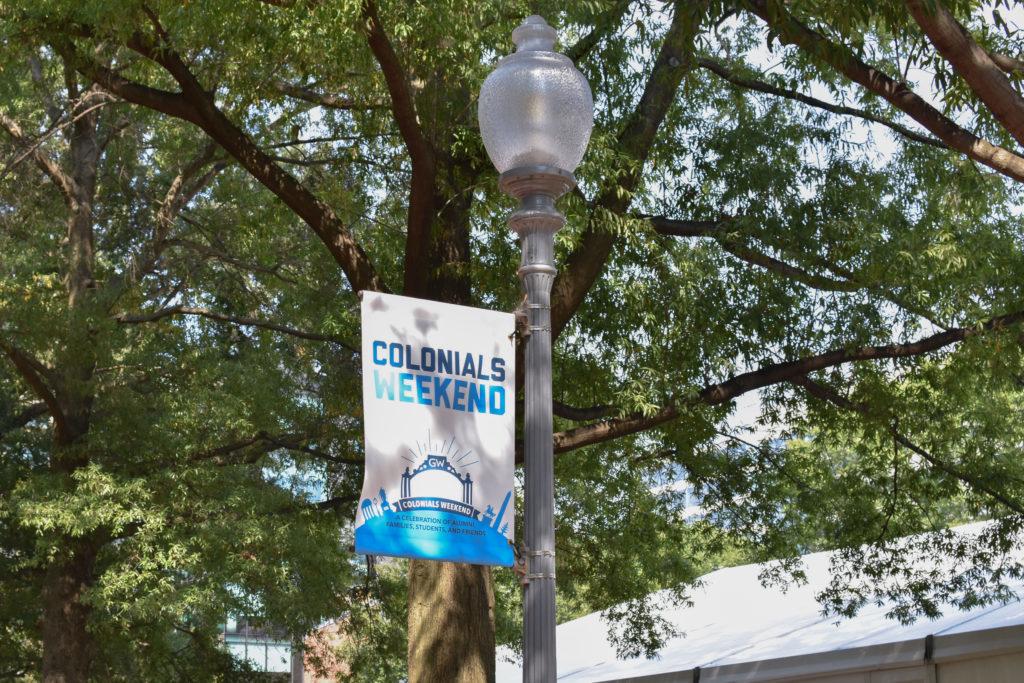This year’s Colonials Weekend notched the highest turnout since officials combined GW’s alumni and family weekends in 2017.
University spokeswoman Crystal Nosal said “approximately 4,000” alumni and family members attended this year’s event, held from Sept. 20 to 22, after officials engaged in “targeted outreach” to promote the weekend’s events. Alumni relations experts said the increase indicates alumni satisfaction with their experience at GW and could signal a future jump in donations.
“The record turnout is a result of the momentum built around the weekend and the University at large as well as enhancements to Colonials Weekend programming and communication to alumni and families,” Nosal said in an email.
University President Thomas LeBlanc said officials cut back on the number of events this year because the large slate of activities in prior years overwhelmed attendees, according to feedback officials collected.
“We got feedback that said there’s too much going on,” LeBlanc said at a Faculty Senate meeting last week. “It’s confusing – where should the parents go? Where should the alumni go? So we came back and did higher-order events and a fewer number.”
LeBlanc said 5,100 people registered for this year’s Colonials Weekend, a “dramatic increase” that demonstrates “extraordinary” engagement from Class of 2023 parents. The attendance figures this year represent a 37 percent increase from the roughly 3,000 alumni and family members that LeBlanc said attended Colonials Weekend in 2018.
Alumni relations experts said the increased turnout could lead to higher fundraising totals from alumni and parents in the future.
Ashley Bonanno-Curley, the associate director of regional and engagement programs at the University of Southern California and an alumna, said alumni relations efforts – like hosting a weekend filled with events and speakers – can foster a greater sense of community, which could attract more alumni donations.
“The University has done a really great job of creating an affinity for the University,” she said. “I think it really speaks to the experience that a lot of students are having in their undergraduate or graduate career at GW.”
LeBlanc outlined philanthropy and constituent engagement as one of his five strategic initiatives shortly after he arrived at GW two years ago. LeBlanc hired former University of Miami administrator Donna Arbide to oversee the University’s alumni relations and fundraising efforts in December 2017 after the University clocked in its lowest alumni donation rate among its 12 peer schools in fiscal year 2017.
Margaret Andrews, the managing director at Higher Ed Associates – a higher education consulting firm – said people setting aside their “valuable” time to return to the University for a weekend shows they care about GW and indicates they will be more likely to donate to GW.
Andrews said that beyond the annual alumni weekend, reaching out to alumni and inviting them back for social events or lectures can enhance alumni engagement. In the long run, improving the student experience – a task LeBlanc intended to address when he took office – could boost alumni engagement and attendance at alumni events, she said.
“The best way to have alumni engagement is to have happy students, because people that have a good experience on campus then feel very connected to the school and are much more likely to come back,” Andrews said.
Brandie Barrera – the senior director of alumni, social media and membership at the University of California, Los Angeles – said administrators can traditionally find it tough to raise attendance figures at annual events like Colonials Weekend, so the boost in attendance indicates officials are “doing something right” in the program changes they have made.
“When you’re messaging correctly, and you make people feel like there’s really something special happening here, and they’re able to see and touch that on a regular basis, they want to come and they want to participate,” Barrera said.
Attendance at Colonials Weekend also spiked in 2006 after officials revamped the program to include new events like a 30-year alumni reunion.
She added that officials can use this opportunity to transform high turnout into future donations by continuing to host events that add value to the lives of alumni.
“My guess is that it will have an impact on fundraising, but I think it’s going to depend on what the alumni organization or the University does to really steward activity in a way that continues to feel meaningful to participants,” Barrera said.





